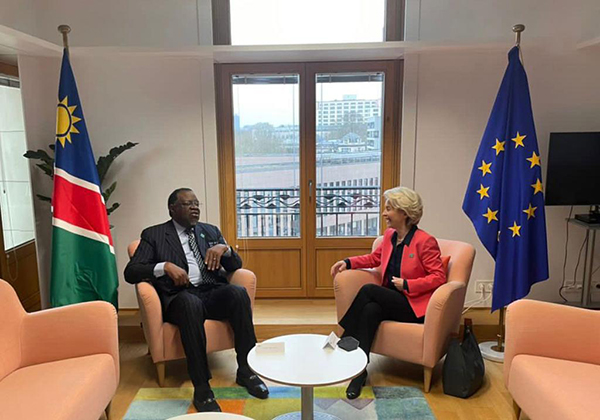Maihapa Ndjavera
The European Union concluded a strategic partnership with Namibia on supply of sustainable raw materials and renewable hydrogen.
President of the European Union Commission Ursula von der Leyen and Namibian President Hage Geingob signed an agreement yesterday at COP27 in Sharm El-Sheikh, Egypt.
The partnership aims to ensure the development of a secure and sustainable supply of raw materials, refined materials and renewable hydrogen to support the green and digital transformation of the partners’ economies.
It deepens the cooperation in areas with mutual benefits for both parties. The partnership will promote local value addition in Namibia by supporting the development of the mining and renewable hydrogen value chains. It will support sustainable
raw materials value chains and
facilitate investment and funding opportunities to modernise the Namibian industries and drive economic and social development.
At the signing, Von der Leyen said: “This is not only a huge step forward for the EU’s climate ambitions but also an agreement beneficial to Namibia, a front-runner in the development of renewable hydrogen in Africa. It shows Europe’s commitment to work with partner countries on our shared commitments to a greener and more resilient future in line with the Global Gateway Strategy.”
The EU and Namibia have committed to develop an operational roadmap for 2023-2024, with concrete joint actions agreed within six months of the signature of the agreement. These actions are to be carried out in close cooperation with relevant industrial and financial stakeholders from the EU member states and Namibia.
The partnership contains six main pillars: Integration, where feasible, of raw materials and renewable hydrogen value chains, including networking, new business models and promotion and facilitation of trade and investment linkages; cooperation to leverage environmental, social, and governance (ESG) criteria and align with international standards.
It also includes the mobilisation of funding for the development of soft and hard infrastructure required for projects development and for leveraging private sector funding through cooperation to address trade matters, including inclusiveness, and improving investments on climate action; capacity building, training and skills development along raw materials and renewable hydrogen value chains;
Cooperation on research and innovation along the raw materials value chain, including on mineral knowledge and circularity, hydrogen technologies and skills; regulatory alignment, standards and
certification.
The German government has already agreed to invest over N$685 million (40 million euros) in Namibia’s green hydrogen sector, while Belgian and Dutch companies are also operating in the country in that field.



